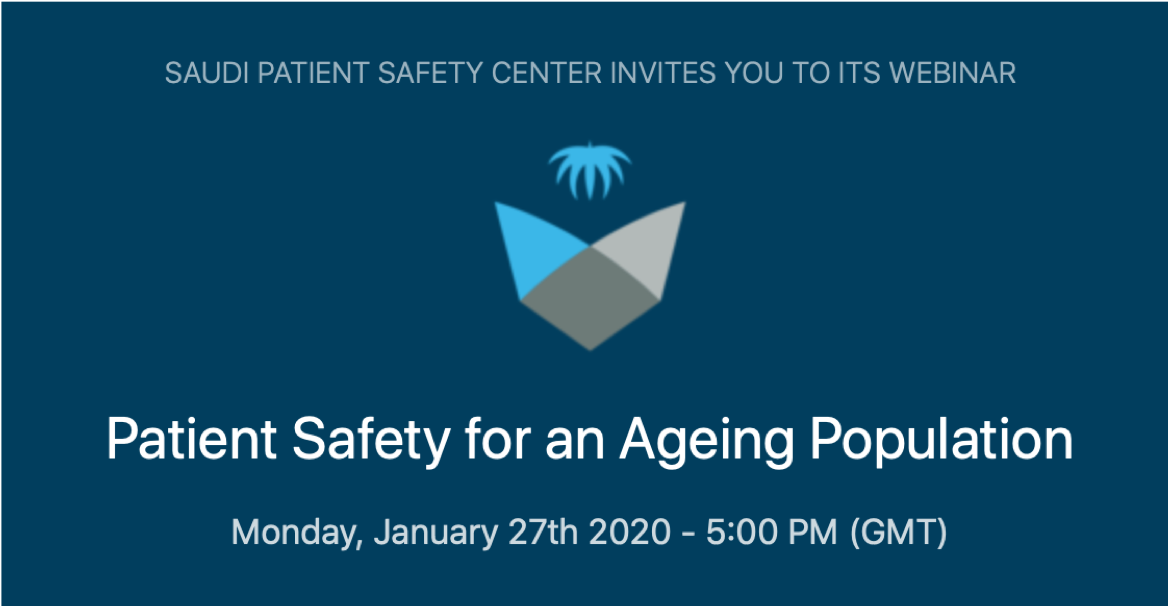Strasys’s Dr Agnès Leotsakos recently presented a webinar for the Saudi Patient Safety Centre (SPSC) on the subject of patient safety for an ageing population. Agnès is also a WHO Consultant (Health systems and services).
The following is an excerpt from the webinar.

The challenge of ageing population
Population ageing is happening in all countries around the world. Increased life expectancy and decreased fertility means that the numbers of ageing people will double from about 1 billion in 2020 to 2 billion in 2050. The over 80-year olds are ageing too. In 2050, there will be three times more their present number to about 400 million[1]. Among the most urgent concerns of the ageing people worldwide is healthcare, also one of the greatest challenges for health authorities, facilities and communities to tackle.
Population ageing is connected with a high demand of health services. The ageing have complicated health needs, multimorbidities, and require a mix of services delivered by numerous health professionals in different types of health facilities. Health systems are designed to address acute care problems and not long-term care as needed for the ageing. This puts ageing patients at greater risk of receiving fragmented, low-quality and unsafe care.
Having multiple health professionals with poor collaboration among them can often result in poor coordination of care and adverse events, especially because treatment of any one condition or disease can create safety risks in another. The ageing, are at increased risk of adverse events in every clinical setting because of their vulnerability, atypical presentation of a disease, naturally-occurring decline of functional integrity and reduced physiological reserve.
Studies have shown that the highest rate of adverse event related to errors are found in ageing patients[1],[2],[3],[4]. In addition to patient safety challenges affecting all patient groups, there are challenges due to unsafe medical care impacting ageing patients including: unsafe use of medication/polypharmacy; healthcare-associated infection; patient falls*; delirium*; decubitus ulcers*.
Too often ageing patients suffer adverse events because of poor care processes including: late or missed diagnosis; mismanagement of patient nutritional/ hydrational status*; uncoordinated care and poor ‘continuum of care’; mishandling of patient cognitive decline; poor access to specialist care; poor communication and sometimes insensitive interactions with professional staff.
More safety challenges relate to structural factors in health facilities for the ageing which include: poor culture of safety; no measures for patient safety; and inadequate training and education of health professionals to keep in pace with the needs and requirements of ageing and long-term care patients.
Improvements of health services for the ageing include:
- integrated care including better coordination between health professionals and facilities for long-term care
- patient-centred, good quality and safe services that respond to ageing peoples’ physical, cognitive and psychological needs, preferences and circumstances,as well as their disease or health conditions
- ‘cultures of safety’ which could remedy many of the problems encountered by patients across all types of healthcare settings.
[1] Long SJ et al. What is known about adverse events in older medical hospital inpatients? A systematic review of the literature Int J Qual Health Care. 2013 Oct;25(5):542-54
[2] Tsilimingras D, Rosen AK, Berlowitz DR. Patient safety in geriatrics: a call for action. J Gerontol A Biol Sci Med Sci. 2003;58(9):M813
[3] Lavan AH, Gallaher P. Predicting risk of adverse drug reactions in older adults. Ther Adv Drug Saf. 2016;7(1):11-22.
[4] Adverse Drug Events in Adults. CDC, https://www.cdc.gov/medicationsafety/adult_adversedrugevents.html
*Geriatric syndromes: a term used by geriatricians to capture those clinical conditions in ageing patients that do not fit into discrete disease categories. These conditions that overwhelmingly affect the ageing patient could be viewed as adverse events because: they can arise from mismanagement of treatment or care for the ageing; they are preventable; prevention requires a system approach to improving care (Tsilimingras D. et al)



